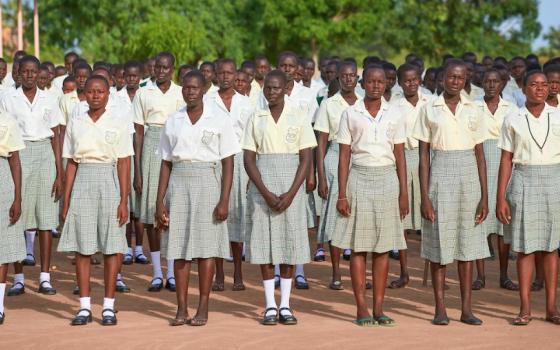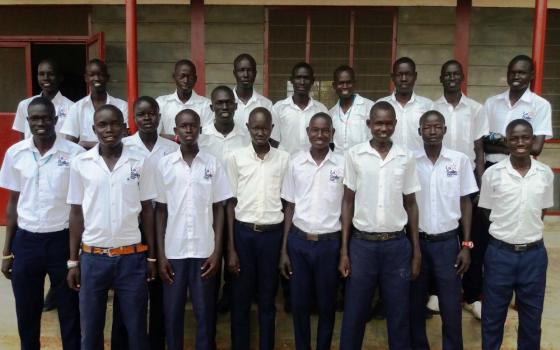There is reason aplenty to be pessimistic about the situation in war-torn South Sudan.
But is there any reason to be hopeful?
Last week, the country's Roman Catholic bishops affirmed the pessimism in a pastoral message that was as much a warning about the latest peace agreement signed by warring parties as it was a policy recommendation to the nation's leaders.
"The 'peace' which is being spoken of is not a true and lasting peace," the bishops said in a pastoral message at the conclusion of a two-day meeting that ended Feb. 28 in the capital of Juba. "We fear that this peace agreement is fatally flawed in itself and cannot bring true peace; we fear also that the current leadership does not have the will to implement peace."
The latest agreement, signed in September between President Salva Kiir and opposition leader and former Vice President Riek Machar, shows signs of unraveling, the clerics declared, with all parties in the conflict "involved either in active fighting or preparations for war."
The September agreement was the latest in a series of pacts to try to end a civil conflict that began in 2013, two years after South Sudan became independent of Sudan, and which has killed about 400,000 persons and displaced millions, many to neighboring countries such as Uganda.
I had just finished interviewing a North American Catholic sister with long ties to South Sudan when the news of the pastoral letter was released.
She called the letter "a remarkable document" and a rather "bold" statement for this group of bishops. One of the signees, Auxiliary Bishop Santo Loku Pio, has not been shy about discussing the war and the role of the South Sudanese government has played in it, saying "the people are suffering as a result," he told me during an interview in May 2017 in the capital of Juba.
Last week, Loku Pio said very little in response to my emailed queries about the situation in his country, probably because the statement he and other clerics signed was just being prepared.
The document has a dire prophetic edge to it: "The value of human life and dignity is forgotten as human rights abuses continue with impunity, including murder, rape, widespread sexual violence, looting and the occupation of civilian land and property," the bishops said, adding that organized crime appears to be on the increase.
Murder, rape, widespread sexual violence and looting — it's no wonder that concern about security is a paramount among those who work or have traveled to South Sudan, and it's why I agreed not to identify the sister I interviewed.
I asked her about her take on earlier reports by the United Nations assessing the situation — reports that basically presaged the bishops' assessment.
The first report, issued Feb. 20 by the U.N's Commission on Human Rights in South Sudan, said that ongoing human rights violations and violence against civilians — including rape and gang rape — could amount to war crimes.
"There is a confirmed pattern of how combatants attack villages, plunder homes, take women as sexual slaves and then set homes alight often with people in them," said Yasmin Sooka, the commission's chairperson.
"Rapes, gang rapes, sexual mutilation, abductions and sexual slavery, as well as killings, have become commonplace in South Sudan. There is no doubt that these crimes are persistent because impunity is so entrenched that every kind of norm is broken," Sooka said in urging the government of South Sudan and those involved in the conflict to respect the ceasefire and implement the peace agreement.
Another report, issued Feb. 22 by the U.N's Food and Agriculture Organization (FAO), the United Nations' Children's Fund (UNICEF) and the World Food Program said that the number of those in South Sudan who are acutely "food insecure" has increased by 13 percent since the start of 2018. ("Food insecure" is a term that refers to people who do not have access to a reliable source of food.)
The United Nations agencies urged more support for humanitarian assistance in South Sudan. "Unless we scale up humanitarian and recovery activities soon, more and more people will be at risk," Simon Cammelbeeck, the World Food Program's acting country director in South Sudan, said in a statement.
The agencies noted that in addition to drought, food insecurity "is driven by population displacement and conflict, which disrupts food production, depletes livestock and limits access to alternative food sources."
As part of the worsening situation, malnutrition levels in South Sudan are "already critical and threaten to worsen, with some 860,000 children under age 5 severely malnourished," the United Nations reported.
The sister I interviewed has visited South Sudan five times since 2013. She concurred with the U.N. officials that the focus on humanitarian needs should take top priority — though she acknowledged the ongoing crises places a burden on those working to improve the humanitarian situation on the ground.
"Certainly rape has become a weapon of war," she said. "In many places, there is no respect for human life."
At the same time, the sister said, humanitarian efforts continue in many areas, with the situation even improving in some locales. "It depends on where you are," she said, adding that in areas not facing immediate violence, "you're not thinking of it [the violence]."
Still, the unease is real and the sporadic nature of violence in the country has the effect of paralyzing people, she said. "Everyone in South Sudan is traumatized, from the leaders on down."
Because of that, the church's humanitarian and pastoral efforts in South Sudan have to continue. "We still need to address the underlying issues and needs in the country such as education, training of health care professionals and training leaders in trauma healing," the sister told me.
One effort that continues despite all of the immense challenges in South Sudan is the work of Solidarity with South Sudan, a global network of religious congregations of sisters, brothers and priests who collaborate to train leaders, nurses, teachers, midwives and others in South Sudan.
In a recent letter to Solidarity donors, Br. Bill Firman, an Australian LaSalle Christian brother who heads the network, hailed ongoing work, saying the church "is very much alive in Africa."
He noted that the Irish province of the Loreto Sisters opened a secondary boarding school in the city of Rumbek a decade ago. "It has now grown to cater for 300 girl boarders," he said. "They also run a primary school for approximately 600 boys and girls."
Firman's congregation, he noted, "began a secondary school for boys last year with 26 boys" and all completed their first-year requirements. "News of good education spreads," Firman added. Recently, "there were more than 400 applicants for 100 places in Loreto and 182 for 40 places at La Salle Secondary," he noted.
"These schools would not exist were it not for the zeal of the religious congregations. Nor would they exist without the generous support of donors in distant countries. This is the church fulfilling its mission. It is good to be part of it."
Despite the agony faced by many in South Sudan, the bishops in their pastoral statement affirmed the work of sisters, other religious, clergy and diocesan workers. They noted that the church is planting seeds for a better future — a point of pride for all of those, like the courageous sisters I have met on two assignments in South Sudan, who continue to work in some of the toughest conditions imaginable.
"The Catholic Church will continue to use its preaching, teaching and pastoral networks," the bishops said, "to create an atmosphere conducive to peace and reconciliation at every level."
[Chris Herlinger is GSR international correspondent. His email address is cherlinger@ncronline.org.]



